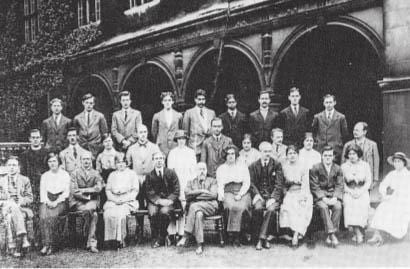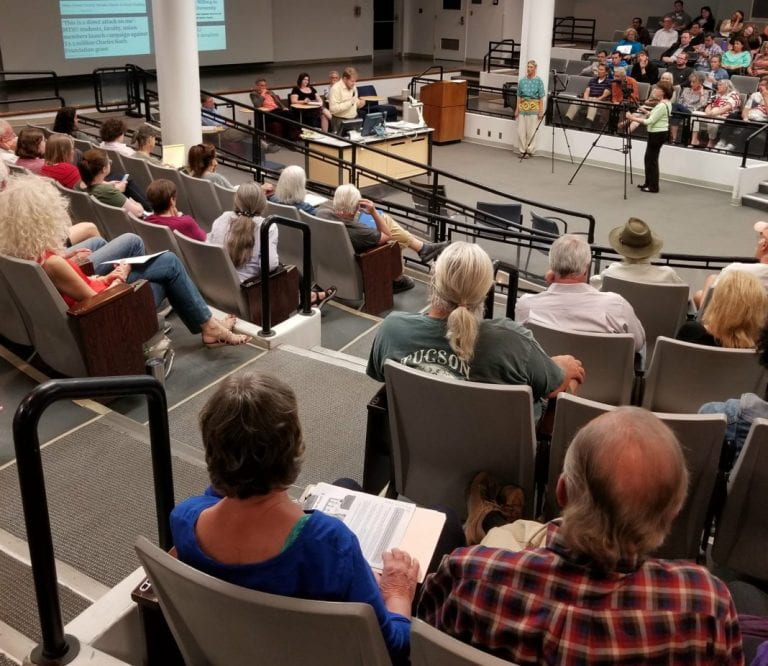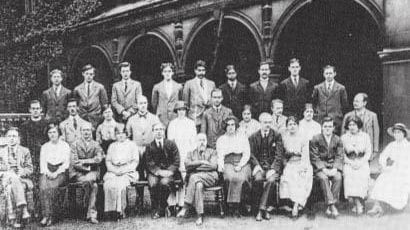By contributing writer David Loner
In September 2017, the University of Arizona named its new department in the College of Social and Behavioral Sciences the “Department of Political Economy and Moral Science” (DPEMS). For those American political philosophers and social scientists affiliated with the DPEMS, Moral Science—or more generally, the Moral Sciences—suggests a “normative inquiry [which] has to begin with what humans and their social ways of living are really like.” Under this definition, the Moral Sciences is a project in social theory and political economy, building on the work of the University of Oxford’s Philosophy, Politics, and Economics course, the first academic institution to explicitly align doing philosophy with the study of politics and economics (Munger, interview). To the student of philosophy in the twentieth century, this is a curious development in the afterlife of the Moral Sciences at the University of Cambridge, the first and until recently only Atlantic world academic faculty in the Moral Sciences. For left unstated by the UA department’s mission statement and institutional development is a history of ruling-class presumptions, ingrained in the term of art, Moral Sciences, and transmitted over the course of the twentieth century from the United Kingdom to the United States. Affecting both cultural and political attitudes on the matter of doing philosophy in the contemporary American university, Moral Sciences now requires a new intellectual history. This essay is the first contribution to such a history.
Moral Sciences drifted as a term of art at Cambridge between the late-nineteenth and early twenty-first centuries. From 1861 to 1969, it remained, according to David Palfrey, a “mysteriously connoted ideal,” signifying something contrary to economics and history yet also in keeping with internalized psychology and mathematicized abstraction. Formed in 1851 as a post-graduate examination and revised after 1860 to include a distinct “Tripos” or honors undergraduate curriculum, Moral Sciences initially served as a compromised body of texts between five pre-existing university chairs at Cambridge. These were the chairs in moral philosophy, history, political economy, English law, and general jurisprudence. Later, in the twentieth century, Moral Sciences became a byword for the style of philosophy known as “analytic philosophy,” Cambridge’s in-house practicum. Among its canonical teachers were philosophers Bertrand Russell, G. E. Moore, Ludwig Wittgenstein, Frank P. Ramsey, John Wisdom, and G. E. M. Anscombe. More than any other faculty in the United Kingdom, the Cambridge Moral Sciences offered self-consciously unconventional men, and after 1922, women, a meeting-house in homosocial ventures for the life of the mind. Through intimate and convivial discussions of propositions, remarks and language-games, students and their teachers, known commonly as “dons,” cast off the “phenomenal” of the everyday, the world beyond Cambridge, in favor of an allegedly resplendent “Reality,” a life of the imagination.
It was the product of a “little world” of elite masculinity and fraternity available only to a select number of the sons of Cambridge’s top colleges clever enough to join the ranks of semi-secret intercollegiate essay societies like the Society of Apostles as well as sit for the Tripos in philosophy. Following the First World War and the decline of the Apostles, this Cantabrigian form of sociability among the educated classes evolved to include individuals of less privileged backgrounds; the honors system devolved into a uniform undergraduate course available to virtually all students. Additionally, students could now take a degree in the Ph.D. in Moral Sciences. (The Ph.D. would be established at Cambridge in 1919.) Conversations concerning the Moral Sciences now took place among elective research seminars, most notably the Cambridge Moral Sciences Club (see image 1); its focus on questions of method in the study of language, logic and mind.

Fifty years after its removal from Cambridge course announcements in October 1969 (see image 2), Moral Sciences today suggests a public policy American program in PPE. Unlike the Moral Sciences at Cambridge or PPE at Oxford, those “ways of knowing” provided by the Moral Sciences in the United States are ostensibly available to all state university undergraduates and professional academics seeking studies in “the moral and historical foundations of economic institutions and political-legal structures,” irrespective of honors standings or society membership. The Moral Sciences under these terms stresses its social scientific credentials. It see itself as a scholastic endeavor for individuals in public policy and business, based foremost on logical thinking and complex conceptual analysis. The Moral Sciences provides specialized studies in “necessary truths and necessary conditions,” culled from both moral theory and Cambridge’s “analytic tradition” and synthesized alongside projects in “political theory,” “economic history,” “rational choice theory,” and “rational analytic practical ethics.” It is skeptical of the merit of PPE at Oxford and the Moral Sciences at Cambridge as truly interdisciplinary ventures, yet nonetheless seeks to build on their legacies. (Munger, interview)

session of the Minutes of the Cambridge Board of the Faculty of Philosophy. Reproduced by kind permission of the Syndics
of Cambridge University Library.
Undergirding this reception of the Moral Sciences and PPE in the United States is a belief among American philosophy faculty that philosophy today must pursue public engagement in order to pay its own way in cost-effective neoliberal academia. This is felt to be particularly true in the case of political philosophy’s relationship to “real-world, moral questions,” notions felt to be distinct from “subjective” or relativist perspectives. Political philosophy, unlike the Moral Sciences or PPE of yore, is held to be concerned about accountability in “empirical testing.” What is more, departments like the DPEMS seek to place emphasis on the need for administrative structures and effective engagement with students, as well as clearer access for “community organizations” and “institutions” seeking to partner with universities.
The initiative has brought renown to the Moral Sciences at UA. The effects of this absent-minded integration of British “Learned Class” readings in philosophy along with public policy funding in the American university have been profound for literature in the study of social mores as social science. A wide array of grade school teachers and students, undergraduates, and post-graduates have all been brought into the discussion of PPE and the Moral Sciences as it pertains to normative inquiry and problems of distribution, poverty, and freedom and entrepreneurship. To be sure, with this variation on applied philosophy, the DPEMS can be seen as meeting a growing demand by Republican Party-led state legislatures to make philosophy satisfy “clear career pathways” set by neoliberal presumptions of “potential benefits of ‘investing’ in others.” It has also caused controversy. Aligned with the conservative-libertarian Charles Koch Foundation and its network of affiliated donors are said by progressive actors to be initiatives by the DPEMS in crafting undergraduate and graduate programs for ideological ends. Also by virtue of the DPEMS’s service as “house” faculty for the Koch-funded Center for the Philosophy of Freedom at UA, the department has recently come under sharp criticism from progressive non-profit organizations.
In particular, this new place in the syllabus of the Moral Sciences has raised concerns from voices skeptical of libertarian-adjacent donor bases (see photo 3). Specifically, for these activist groups, the Koch family’s reported use of dark money, combined with the Koch Foundation’s proximity to archconservative actors, makes for an unsettling picture of the relationship of PPE in the United States to what is called the “ethical entrepreneur.” Yet, just as with UA’s Moral Scientists, these progressive actors are themselves seemingly unfamiliar with the story of the Moral Sciences as a peculiarly Cantabrigian movement in patrician values.

Samantha Parsons, Director of Campaigns at UnKochMyCampus, a D.C.-based “cooperative campaign” that seeks to “expose and expel undue donor influence in [a]cademia,” is exemplary of the response DPEMS, the Center for the Philosophy of Freedom and the Moral Sciences in the United States’s institutional development has elicited from progressive educated class audiences. By agitating for public oversight of donor intent and ties to billionaire funding, UnKochMyCampus and affiliate groups have petitioned to make available all public documents related to the creation of the DPEMS. (This was achieved after a subsequent controversy involving Freedom Center-crafted curricula in Arizona’s Tucson Unified School District) (Parsons, interview.)
Particularly distressing for Parsons is the fact that the DPEMS was first proposed to UA’s Faculty Senate as “The Department of Moral Sciences” and that the change in name was allegedly made without full review by administrators or faculty. “With the new name,” so has been argued by UnKochMyCampus, “the [DPEMS] can hire economics and political science professors without approval from UA’s bona fide economics and political science departments,” in turn advancing the cause of “stealth politics” by monied conservative-libertarian actors without the expressed consent of university membership, faculty or students (Parsons, interview.)
But to the intellectual historian the situation appears even more complex than Parsons or UnKochMyCampus realize. Encased within the discourse surrounding the Moral Sciences in the United States are a variety of ruling-class presumptions concerning the path of the philosophical life, inherited from past doyens of the American liberal tradition, themselves witnesses to the cultural authority analytic philosophy held in discussions of liberalism in the United Kingdom, and specifically Oxbridge, prior to 1969. Twenty-first-century libertarians, conservatives and progressives in the United States share in this taking of the old to inform the new; each see the philosophical history of the Moral Sciences as a tool to be utilized, less a historical event to be reckoned with.
More specifically still, Moral Sciences as a synonym for PPE obscures the Cambridge Moral Sciences’ own tendentious appeals towards industry and conviviality for a leisurely body of well-educated men and women concerned foremost with the study of language, logic, and mind. Cambridge philosophers’ received folk wisdom—the vast majority of research conducted on its history—only relates a story of “seriousness” in doing philosophy, never quite so interested in the role its curricular history plays in larger societal contests over the “evident tenacity” of resistance towards inclusion and diversity on intersectional terms in today’s university.
The afterlife of the Cambridge Moral Sciences in America is thus a study in reception history and its ties to the contemporary cultural politics of the university in the United States. It tells us a great deal about what American philosophers see in twentieth-century academic lives at elite British institutions like Cambridge, and how they mistake the history of “useful knowledge” in England for the history of real-world, moral questions in America. But it also complicates the position which advocates of intersectional inclusion and diversity on campuses throughout the United States take when marshaling the supposedly pure disciplinarity of academic research in twentieth-century philosophy against institutional alterations by actors, academic and non-academic, within the fields of philosophy, politics and economics. (Parsons, interview)
For as Eric Lybeck has recently argued, in order to truly collectively rethink ourselves as researchers and proponents of academic knowledge within a globalized as well as deglobalized world, university members and graduates should consider the role of the guild in the origins of the universities and academic profession. Specifically, progressives might think on how notions of tradecraft and apprenticeship have closed the university as well as the humanities off from greater social prestige and how these notions might yet still serve to better compliment the university experience with contemporary perceptions of citizenship, inclusivity, diversity and community. How such an argument would work in 2019, and how the “multiple grounds of identity” continue to evade use in academic visions of applying philosophy in the life of the citizen is therefore the work of the historian of Moral Sciences as a term of art and its competing receptions.
David Loner is a Ph.D. student in history at the University of Cambridge. His research examines the history of the Cambridge Moral Sciences and the history of philosophy in the United Kingdom and the United States after 1918. He can be reached at jdl50@cam.ac.uk. Thanks also to Prof. Michael Munger, Samantha Parsons and Tori Woodard for their helpful insight.



